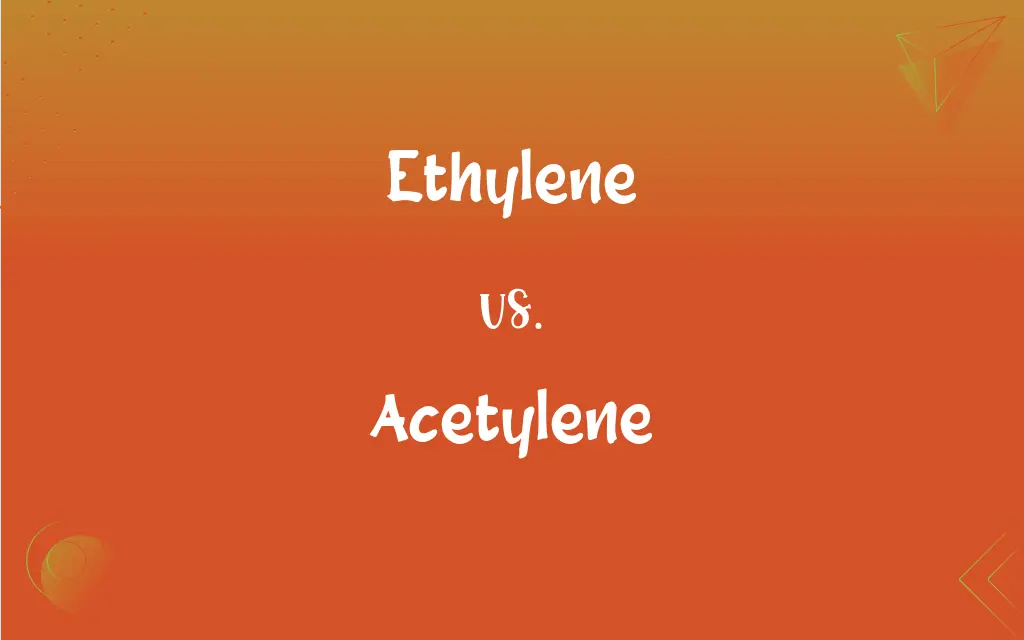Ethylene vs. Acetylene: What's the Difference?
Edited by Aimie Carlson || By Janet White || Published on January 11, 2024
Ethylene is a colorless gas (C2H4), important in plant physiology and used in the chemical industry. Acetylene is a colorless, flammable gas (C2H2), used especially in welding and as a fuel.

Key Differences
Ethylene, a hydrocarbon with a double bond, plays a crucial role in plant aging and fruit ripening, while acetylene is known for its highly flammable nature and is extensively used in welding and cutting metals.
In the field of organic chemistry, ethylene is considered the simplest alkene, featuring a carbon-carbon double bond, whereas acetylene stands as the simplest alkyne, distinguished by a carbon-carbon triple bond.
Ethylene is widely utilized in the manufacturing of plastics, like polyethylene, and is a key hormone in plants. Acetylene, on the other hand, finds its major use in oxyacetylene torches for cutting and welding due to its high temperature flame.
The production of ethylene typically involves steam cracking of hydrocarbons, whereas acetylene is primarily produced by the reaction of calcium carbide with water, showcasing different industrial processes.
Environmentally, ethylene is less hazardous and has a lower impact, while acetylene requires careful handling due to its explosive nature, particularly in its pure form or when mixed with air.
ADVERTISEMENT
Comparison Chart
Chemical Structure
C2H4, with a double bond
C2H2, with a triple bond
Primary Uses
Plant hormone, plastic production
Welding, metal cutting
Production Process
Steam cracking of hydrocarbons
Reaction of calcium carbide with water
Flammability
Less flammable
Highly flammable
Environmental Impact
Relatively low
Higher due to explosive nature
ADVERTISEMENT
Ethylene and Acetylene Definitions
Ethylene
Ethylene is produced by plants and is crucial for processes like leaf fall.
The yellowing of leaves in autumn is partly due to ethylene signaling.
Acetylene
Produced from calcium carbide and water, acetylene is used in lighting.
Before electric lights, acetylene lamps were widely used for illumination.
Ethylene
In industry, ethylene is synthesized from hydrocarbons like ethane and propane.
The steam cracking of ethane produces ethylene for various chemical products.
Acetylene
Acetylene is a colorless, flammable gas used for welding and cutting.
Acetylene torches are common tools in metal fabrication workshops.
Ethylene
Ethylene is a gaseous plant hormone that regulates growth and fruit ripening.
Apples release ethylene, which can speed up the ripening of nearby fruits.
Acetylene
Acetylene, C2H2, is the simplest alkyne with a carbon-carbon triple bond.
Acetylene is used in the synthesis of several organic chemicals.
Ethylene
Ethylene, C2H4, is the simplest alkene used in the chemical industry.
Ethylene is a key raw material in the production of polyethylene plastics.
Acetylene
Acetylene is a key raw material in the chemical industry for producing synthetic rubber.
Acetylene is used in the production of neoprene, a type of synthetic rubber.
Ethylene
Ethylene acts as a signaling molecule in plants under stress conditions.
Plants increase ethylene production in response to drought stress.
Acetylene
Acetylene burns in oxygen with a very high temperature flame.
The intense heat of an acetylene flame makes it ideal for cutting metals.
Ethylene
A colorless flammable gas, C2H4, derived from natural gas and petroleum and also occurring as a natural plant hormone, used as a source of many organic compounds, in welding and cutting metals, to ripen citrus fruits, and as an anesthetic. Also called ethene.
Acetylene
A colorless, highly flammable or explosive gas, C2H2, used for metal welding and cutting and as an illuminant. Also called ethyne.
Ethylene
(organic compound) The common name for the organic chemical compound ethene. The simplest alkene, a colorless gaseous (at room temperature and pressure) hydrocarbon with the chemical formula C2H4.
Acetylene
Any organic compound having one or more carbon–carbon triple bonds; an alkyne.
Ethylene
(organic chemistry) The divalent radical derived from ethane.
Acetylene
Ethyne; the simplest alkyne, a hydrocarbon of formula HC≡CH. It is a colourless, odorless, extremely flammable, explosive gas, formerly used as an illuminating gas, but now used in welding and metallurgy.
Ethylene
A colorless, gaseous hydrocarbon, C2H4, forming an important ingredient of illuminating gas, and also obtained by the action of concentrated sulphuric acid in alcohol. It is an unsaturated compound and combines directly with chlorine and bromine to form oily liquids (Dutch liquid), - hence called olefiant gas. Called also ethene, elayl, and formerly, bicarbureted hydrogen.
Acetylene
A lamp powered by acetylene, particularly a motor vehicle headlight.
Ethylene
A flammable colorless gaseous alkene; obtained from petroleum and natural gas and used in manufacturing many other chemicals; sometimes used as an anesthetic
Acetylene
A gaseous compound of carbon and hydrogen, in the proportion of two atoms of the former to two of the latter. It is a colorless gas, with a peculiar, unpleasant odor, and is produced for use as an illuminating gas in a number of ways, but chiefly by the action of water on calcium carbide. Its light is very brilliant.
Acetylene
A colorless flammable gas used chiefly in welding and in organic synthesis
FAQs
What are the main uses of ethylene?
In plant growth regulation and plastic manufacturing.
What is ethylene?
A colorless gas important in plant growth and industrial plastic production.
How is ethylene produced?
Typically through steam cracking of hydrocarbons like ethane.
What are the primary uses of acetylene?
For welding, metal cutting, and as a chemical precursor.
What is acetylene?
A colorless, highly flammable gas used in welding and as a fuel.
Is acetylene dangerous?
Yes, due to its high flammability and explosive nature.
What industries rely on ethylene?
Plastic, agriculture, and chemical industries.
Is ethylene flammable?
Yes, but less so compared to acetylene.
What safety measures are needed for acetylene?
Proper storage and handling to prevent explosions.
How is acetylene produced?
By reacting calcium carbide with water.
Can ethylene ripen fruits?
Yes, it's used commercially to ripen fruits.
Are there environmental concerns with ethylene?
Less so than acetylene, but its production can impact the environment.
Where is acetylene commonly used?
In welding and metalworking industries.
Can ethylene affect plant stress?
Yes, it's involved in stress response in plants.
What is a unique property of acetylene?
Its ability to produce a high-temperature flame.
How is acetylene stored safely?
In specially designed cylinders to prevent pressure build-up.
Is acetylene used in lighting?
It was historically used in acetylene lamps.
Is ethylene a hormone?
Yes, in plants, it functions as a hormone.
Can acetylene be used for chemical synthesis?
Yes, it's a precursor for many organic chemicals.
Does ethylene have industrial applications?
Yes, especially in the production of plastics.
About Author
Written by
Janet WhiteJanet White has been an esteemed writer and blogger for Difference Wiki. Holding a Master's degree in Science and Medical Journalism from the prestigious Boston University, she has consistently demonstrated her expertise and passion for her field. When she's not immersed in her work, Janet relishes her time exercising, delving into a good book, and cherishing moments with friends and family.
Edited by
Aimie CarlsonAimie Carlson, holding a master's degree in English literature, is a fervent English language enthusiast. She lends her writing talents to Difference Wiki, a prominent website that specializes in comparisons, offering readers insightful analyses that both captivate and inform.

































































